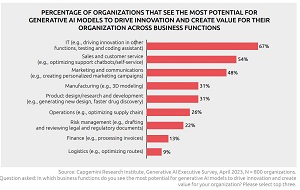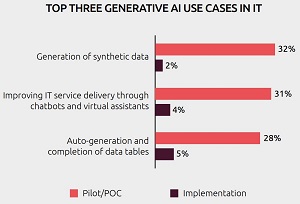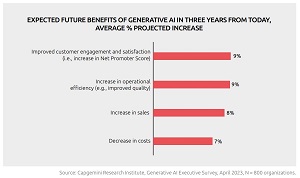News
How Execs See Generative AI Benefits Outweighing Concerns
New research shows how executives see advanced generative AI benefitting their organizations despite numerous concerns.
With generative AI constructs like ChatGPT shaking up all manner of industries, their impact is explored in a new report from Capgemini Research Institute titled "Harnessing the value of generative AI: Top use cases across industries," which examines the transformative force of generative AI for innovation across enterprises.
While that transformative force has given rise to all kinds of fears ranging from stealing jobs to the extinction of humanity, some three quarters of respondents to the firm's survey on the topic give generative AI a thumbs up at the moment, as detailed in a July 6 Capgemini post.
"Despite apparent risks, such as copyright infringement or cybersecurity, 74 percent of executives believe that the benefits posed by generative AI outweigh the associated concerns," Capgemini said. "While 21 percent anticipate a disruption in their industries, 40 percent of organizations across industries have already established teams and budget for the technology, with a further 49 percent contemplating doing so within 12 months."
Other highlights of the report as presented by Capgemini include:
- Organizations believe that the most relevant generative AI based platforms or tools for their industries are chatbots for automating customer service and improving knowledge management (83 percent) and designing, collecting, or summarizing data (75 percent)
- Most executives believe that generative AI will make product and service design more efficient (78 percent) and accessible (76 percent)
- They also said it will make customer experiences more interactive and engaging (71 percent) or improve customer service with automated and personalized support (67 percent).
As far as who will benefit, execs indicated they see the most potential for generative AI in IT for tasks such as testing or assisting in software development. Other areas seen to benefit include: sales and customer service; marketing and communications; and other sectors.
 [Click on image for larger view.] The Greatest Potential for Generative AI Lies in the IT Function (source: Capgemini Research Institute).
[Click on image for larger view.] The Greatest Potential for Generative AI Lies in the IT Function (source: Capgemini Research Institute).
And within IT, the top three use cases for generative AI include: creating synthetic data; improving IT service delivery through chatbots and virtual assistants; and auto-generated and completion of data tables.
 [Click on image for larger view.] Top 3 Generative AI Use Cases in IT (source: Capgemini Research Institute).
[Click on image for larger view.] Top 3 Generative AI Use Cases in IT (source: Capgemini Research Institute).
Surveyed execs also see a range of further benefits coming soon.
"Within three years' time, and following the successful implementation of generative AI, executives foresee a range of benefits," Capgemini said. "They believe that its integration will lead to an 8 percent increase in sales and a 7 percent decrease in costs. Alongside this, those surveyed indicated that they could expect to see a 9 percent improvement in both customer engagement and satisfaction, and operational efficiency."
 [Click on image for larger view.] Gen AI Benefits Within Three Years (source: Capgemini Research Institute).
[Click on image for larger view.] Gen AI Benefits Within Three Years (source: Capgemini Research Institute).
Other data points plucked from the report include:
- 60 percent of respondents believe that generative AI will completely revolutionize the way we work
- 96 percent of organizations say generative AI is a topic of discussion in their boardrooms
- 40 percent of organizations have already established teams and budget for generative AI, while another half (49 percent) are contemplating doing the same within 12 months
- 9 percent improvements expected in operational efficiencies and customer satisfaction in three years from now due to generative AI
- 51 percent cite the lack of clarity on underlying data used to train generative Al programs as a challenge
Capgemini said organizations can kick-start their generative AI journeys in these ways:
- Integrate generative AI into organizational strategy and operations
- Drive a human-centered approach to scaling generative AI
- Focus on sustainable development
- Build trust and responsibility in AI systems
- Establish guidelines for the use of generative AI in the organization
- Regulators should safeguard consumer interest
"As the technology evolves, organizations' expectations are bound to change," the report said in conclusion. "Can generative AI disrupt industries? And what will be its impact in the long term? Will benefits fall short of, meet, or exceed expectations? How can the challenges around hallucination, data leakage, sustainability, and legal and reputational issues be overcome? And what role will regulators play in this evolving market? It is not yet clear how all these elements will unfold. What is clear is that generative AI technology is part of the future and organizations should start to prepare for it."
The report is based on a targeted survey of 1,000 organizations interested in exploring generative AI that took place in April 2023. In addition to the online survey, Capgemini conducted in-depth interviews with 10 industry executives to understand the potential of generative AI, the challenges they foresee, and the capabilities required to deploy the technology. "The study findings reflect the views of the respondents to our online questionnaire for this research and are aimed at providing directional guidance," Capgemini said.
About the Author
David Ramel is an editor and writer at Converge 360.